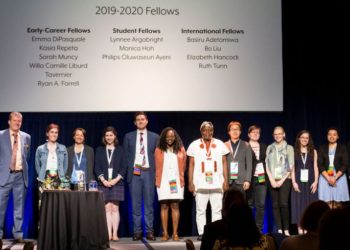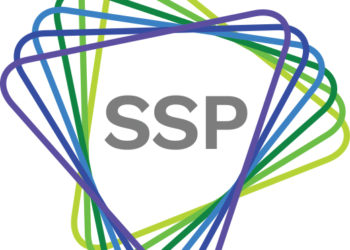This year’s Society for Scholarly Publishing (SSP) Annual Meeting came to a close last week. The 2021 SSP Annual meeting was the first of its kind in our history, completely virtual, yet still focused on community and networking. For me, it brought together the best of both worlds – although I missed not being there in person.
Many of the Chefs attended all or part of the meeting, so we asked them: What did you consider a highlight of the 2021 SSP Annual meeting?

Angela Cochran: While the content of SSP was outstanding as usual, the highlight for me was the networking. I never thought I would say that about a virtual meeting. I participated in my assigned Community Groups and had conversations that felt just like meeting at a table while having a coffee in the exhibit hall. Speaking of meeting at a table, the Remo platform for networking was also a lot of fun. Last, but not least, I loved having the live chats with exhibitors in the Marketplace. I wish I had a bit more time as I found the conversations so engaging that I could only visit 2 or 3 exhibitors per session.
I received great feedback on the networking as well. In one Community Group discussion, I was told that a group was appreciating opportunities to meet new people and hoped that we could somehow replicate the virtual networking at the live meeting! Yes, you read that right.
In the comments of the closing TSK plenary, someone wrote that they had the same feeling at the end of this meeting as they do for live meetings — tired, engaged, excited, and disappointed it’s over. I felt the same way.
In the comments of the closing TSK plenary, someone wrote that they had the same feeling at the end of this meeting as they do for live meetings — tired, engaged, excited, and disappointed it’s over. I felt the same way. There were some exhibitors I left a card for but did not get to pop in on, some colleagues I never ran into, a few posters I would have liked to discuss with the authors, some networking sessions in Remo that I missed. Still, I feel like for the first time over the last 15 months, I actually attended a conference instead of hovering around one. And having too many opportunities to connect is a good problem to have.
I have been trying to think of why this was such a hit when other meetings have been so-so. There are two reasons that come to mind. First, there were different options for socializing — structured, unstructured, in Zoom, in Remo, assigned groups, and free floating. Second, SSP is a community of engaged individuals that actively seek out and enjoy socializing.
While I have chosen to focus my remarks on the social aspects, I want to acknowledge that every session I attended was fantastic. The addition of posters was wonderful. The breaks in the day made it easy to keep a few necessary meetings on my calendar. I literally cannot stop thinking about the keynotes. A huge congratulations are owed to Cason Lynley, Yael Fitzpatrick, Lori Carlin, the entire Annual Meeting Program Committee, and SSP staff. I can’t wait to be in Chicago next year.
A huge congratulations are owed to Cason Lynley, Yael Fitzpatrick, Lori Carlin, the entire Annual Meeting Program Committee, and SSP staff. I can’t wait to be in Chicago next year.
Tim Vines: I have to admit to a wide range of emotions about our own session (‘Session 4B: Walking the Rocky Road from Policy to Compliance’), not least because it was a new thing both for us as the organizers and the conference as a whole. So, one highlight was getting that finished without any major gaffes. I also really enjoyed all the small group sessions I attended – having ten or so familiar and unfamiliar people in a ‘room’ to discuss a topic led to some really useful exchanges of ideas. There’s admittedly quite a few presentation videos I need to get through over the weekend, which means I might have new conference highlights by the time this post goes live…
Alice Meadows: Choosing just one highlight from this year’s SSP annual meeting is basically impossible — kudos and thanks to all involved for making our first (maybe last?) virtual conference so informative and enjoyable! As always, I couldn’t get to anything like all the sessions I wanted to, but luckily everything was recorded — so I look forward to catching up on more of the great content in the coming weeks. At the conference itself, I decided to prioritize sessions that focused on aspects of diversity, equity, and inclusion, since this is such an important part of SSP’s work — and something that we will continue to prioritize in the next 12 months. As outgoing President, Lauren Kane, noted, we’ve made progress, but there’s still a lot of work to be done.
At the conference itself, I decided to prioritize sessions that focused on aspects of diversity, equity, and inclusion, since this is such an important part of SSP’s work – and something that we will continue to prioritize in the next 12 months.
From Dr. Joseph Williams’ keynote to the three concurrent sessions, I attended (on removing barriers for people with disabilities, using data to accelerate DEI, and the impact of the pandemic on scholarly publishing’s inequities), I was delighted that there was such a strong focus on action — at both the personal and the organizational levels. Many of the speakers shared their own experiences, none more powerfully than Ruth Wells, whose talk on being bipolar in scholarly publishing was one of the most courageous, inspiring, and helpful I’ve ever attended (you can hear her and another of the speakers in this session, Katy Alexander, who is dyslexic, talk about their experiences in this Scholarly Kitchen video post).
All the speakers also provided valuable, if often depressing, data to support their talks. For example, Cassidy Sugimoto shared research showing that, even when women and men both report sharing household tasks equally, in fact, women are doing the vast majority (with the exception of sports coaching, which men do more of!). Holly Falk-Krzeskinski noted that the pandemic has pushed the time it will take to achieve gender pay equity back from five generations to nearly seven. More positively, Katy Alexander told us that increasingly companies are actively recruiting neurodiverse staff, because they see the bigger picture, have improved pattern recognition, are good at seeing outside the box, and more.
But perhaps my two biggest takeaways came from Dr. Williams’ talk. First, his emphasis on the need for us to see DEI as a moral imperative, not “just” a business one. As he put it, “The scholarly publishing community has a moral and ethical obligation to examine the ways whiteness and white supremacy is systematically embedded in the industry to the detriment of Black, Indigenous, and People of Color.” At the same time he also reminded us that, as “the gatekeepers of information”, there is no more important industry than ours when it comes to DEI. So, let’s be the leaders we can and should be!
“The scholarly publishing community has a moral and ethical obligation to examine the ways whiteness and white supremacy is systematically embedded in the industry to the detriment of Black, Indigenous, and People of Color.” Dr. Joseph Williams, Fighting Racial Inequity in the Publishing Industry: Closing the Intention-Behavior Gap
Robert Harington: This year’s SSP meeting shows how far we have come in the space of a year as we deal with so much loss across the world and work out how to keep on going. It will never be business as usual, but I am constantly amazed at the ingenuity, determination, and compassion of my colleagues as the publishing business has moved to function remotely, including the running of conferences.
There are clearly drawbacks and indeed benefits to virtual conferences. It is so much harder to attend a conference from isolation at home. You just can’t have a serendipitous conversation with a colleague over a drink like you would in person. It is curiously hard to separate from day-to-day work activities when you attend a conference virtually. On the other hand, a virtual conference clearly allows those who may not be able to attend in-person a path to participation. This has led to many conferences developing a more equitable and inclusive approach to holding a conference – something we can learn from as we drift back to seeing each other face-to-face.
This year, the SSP was held over the space of a week and was a resounding success. Yes, there were the occasional technical glitches. Yes, it was hard to devote time in the week to the conference, away from the day job. But it worked, and it worked because the community came together to listen, learn, chat, and support in a virtual world. I was particularly taken with the Pathable platform, and the use of the Remo lounge for networking. Pathable was intuitive, and while not perfect, it allowed for a solid blend of recorded presentations and live interactions. The Remo lounge was wonderful. You could sit in what at least looked like a comfy chair, and chat with colleagues – all that was missing was a cocktail or two.
But it worked, and it worked because the community came together to listen, learn, chat and support in a virtual world. I was particularly taken with the Pathable platform, and the use of the Remo lounge for networking.
There were many good sessions, but if I were to pick one to highlight it would be the important keynote from Dr. Joseph Williams, entitled Fighting Racial Inequity in the Publishing Industry: Closing the Intention-Behavior Gap. Joseph’s session, for me at least, highlighted a practical and empowering path that we can all follow, steering away from the performative and towards actions small and large. I find this persuasive, and indeed at the AMS, this is what we are attempting to do — projects that aim directly at “closing the gap”.
Alison Mudditt: I’m going to cheat and have two highlights. The first was the meeting itself: both the program committee and the SSP staff achieved amazing things under highly constrained conditions. It was one of a handful of events (well, three) that I’ve attended over the past fifteen months that came close to feeling like a true community event. A virtual event needs to be produced in the context of online fatigue and an understanding that there are many pulls on everyone’s time. If the platform is difficult, attendees will leave. If the content is not top-of-the-line, attendees will leave. If the experience doesn’t provide value, attendees will leave. The annual meeting team deserves our kudos and thanks that they delivered on all three of these. It doesn’t mean that I didn’t miss the gossip and cocktails with old friends, but it was a pretty strong second best.
…both the program committee and the SSP staff achieved amazing things under highly constrained conditions. It was one of a handful of events (well, three) that I’ve attended over the past fifteen months that came close to feeling like a true community event.
After over a year of the constraints and disruption of pandemic life, it was appropriate we focused on a new course. The pandemic has been a watershed in so many ways and it is unthinkable that we simply return to the way things were. The highlight of the meeting for me was to see this recognition woven into so many conversations across different sessions. Just a few:
- We heard a lot about new equitable and sustainable business models for open access and why APCs and “transformational” deals – even with waivers – can’t deliver this. My takeaway tweet was this:
IMO, it doesn’t matter that LMIC researchers don’t complain about having to ask for APC waivers. They simply shouldn’t have to accept them as a reality. We can do better, and design systems that treat them as equal participants. Design for dignity
— Kamran Naim (@kamrannaim) May 25, 2021
- There were a number of well-attended sessions on building the next level of diversity, equity and inclusion in scholarly communication, including a challenging and thought-provoking keynote from Dr. Joseph Williams.
- The environmental dimension and carbon footprint of the industry came up in a number of sessions, including from early career researchers and Haseeb Irfanullah in the closing plenary.
Judy Luther: Although I am tempted to recognize the Posters, which were informative and a delightful opportunity to discuss a topic of mutual interest, and the many opportunities to connect during the meeting (kudos to SSP planners), I have to say that Session 4B – Walking the Rocky Road from Policy to Compliance was the most creative and fun session I’ve attended in a long time. The timing of the session was well placed — mid-afternoon on the second day of the conference – about the time your attention is flagging and your brain feeling too full.
I have to say that Session 4B – Walking the Rocky Road from Policy to Compliance was the most creative and fun session I’ve attended in a long time.
Heather Staines and her hearty band of travelers were on A Quest! A Quest! Each of the panelists appeared in garb suitable for the Tale being told.
The path from Policy City to the Castle of Compliance set the stage for the adventure.
- Tim Vines (reminding me of a Monty Python character) framed the story and connected the parts.
- Jessica Miles (Elsevier) highlighted conflicting OA requirements of the University (Green OA) and the Funder (Gold OA) complicated by the chosen journal (subscription based).
- Natasha Simons (Australian Research Data Commons) laid out the challenges of navigating policies of the Funder and the Publisher and offered a Data Policy Framework designed to clarify the matter.
- Ginny Barbour (Queensland University of Technology) wrestled with the issues of p-hacking, plagiarism, and salami slicing as all sought integrity.
Wonderfully illustrated slides supported the characters in their various roles as they discussed the challenges facing all participants. Polls united the audience in choosing a common response! The answer to the final poll was “OPEN is the solution!” The travelers then discussed matters and topics from the audience among themselves. AND the session ended on time!
Ann Michael: As others have already mentioned, the programming for the SSP Annual Meeting was excellent, there were networking opportunities, and time to interact with exhibitors and sponsors. Another happy addition for me is that the recorded sessions are available to attendees to revisit (or visit the first time) through November. How is it that there is always at least one time slot where I want to go to ALL of the sessions? That happened to me this year with Session 4, so I have not yet seen Walking the Rocky Road from Policy to Compliance — but I plan to!
Perhaps the thing I found most reassuring and surprising was the buzz. Even outside of the virtual platforms SSP leveraged, I found the meeting coming up in conversations all week (on Zoom calls, texts, emails…), with different folks talking about sessions, or what Remo was like, or how excited they were about attending. More than anything else, that made me feel like I was there.
Of course, next year I need to catch up on missed hugs. But for now, I am grateful that 2021 didn’t cause us to miss SSP altogether.
We needed it 🙂
My sincerest thanks to everyone that worked to make it such a success!
Did you attend? What did YOU consider a highlight of the 2021 SSP Annual meeting?
Discussion
2 Thoughts on "Ask The Chefs: 2021 SSP Annual Meeting"
Congrats all, excellent event, Tim, Heather and crew, you win the award for most creative and entertaining session, and I think you should already be thinking about and planning next years session, I assume you have already received the invitation 😉
I did actually like the gamification part of the attendance with points for different activities, although my in-box has perhaps since regretted it slightly. Look forward to next year in person, with a hybrid/virtual option.
Well done, SSP! I’ve done a LOT of virtual events this past year—both in scholarly publishing as well as other industries. The platform selection combined with the attendees’ enthusiasm is what made this the best virtual conference I’ve experienced. I made the commitment to turn off from my day job and focus on SSP as I would if it were IRL.
I always enjoy the SSP Previews. The 5-minute format is great and the voting aspect was fun. Same for the poster sessions. As others mentioned, I have a number of presentations bookmarked to watch that I couldn’t attend live.
There was also a session highlighting a case study of author engagement using the March Madness bracket format. I’m trying to find that presentation (or poster?) to share with a colleague and can’t zero in on it. The search functionality on the platform is not revealing anything. Tagging and archiving all the content with a layer of search for future retrieval would be fantastic.
Speaking now as an exhibitor…we’ll just never be able to get the same engagement no matter how excellent the platform. It was great to get the metrics of visits and downloads and video views but simply not as informative to speak with folks individually. (I tried not to wear my exhibitor hat too much in the informal networking sessions.)
I really loved seeing so many first-time early career attendees. Clearly we’ll need to make space for these folks next year in some kind of hybrid capacity.
Melanie, Jackie, Lori, Yael, Cason—You all knocked it out of the park. Thanks so much.



